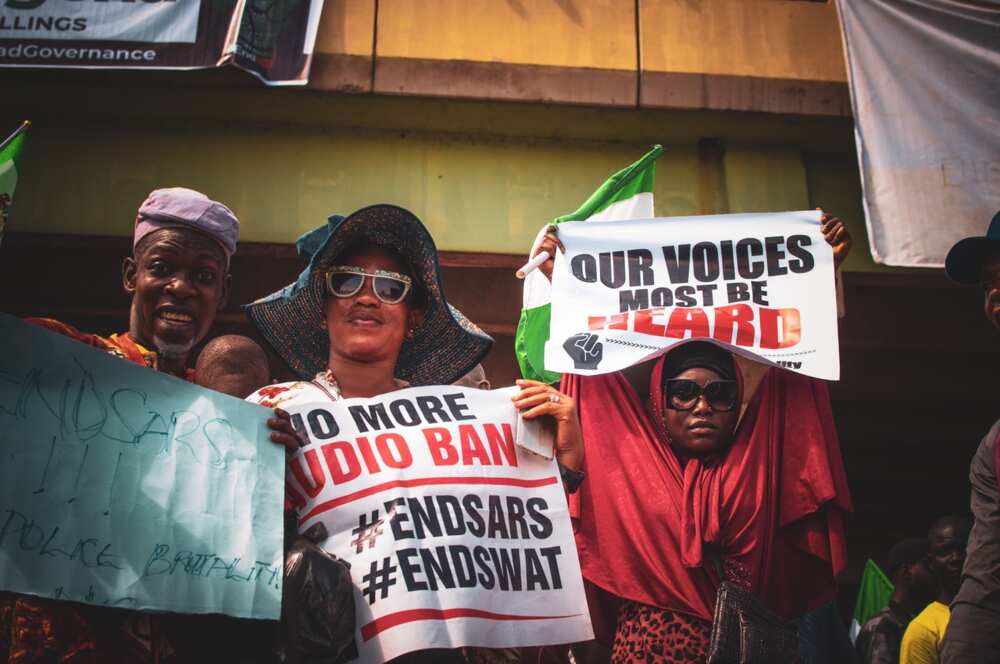What are the main reasons for political restructuring in Nigeria?
What is political restructuring? It is simply the transfer of powers from the Federal Government to state governments and local governments. With political restructuring, the state can control some percentage of its resources rather than the federal government controlling entirely all the resources. What are other reasons for political restructuring?

Source: UGC
Restructuring has become a common language used in Nigeria over the past recent years now. Many prominent Nigerian leaders have been arguing that the federal government needs to restructure Nigeria to improve the country economically and socially.
What is restructuring in government?
Restructuring is defined as a constitution review strategy aimed at bringing a government as closely as possible to its people at the grassroots. Political restructuring in Nigeria is urgently needed to advocate a change to the current political governance structure.
For a long time, Nigeria has been controlled by the Federal system, where all the resources have been particularly managed and controlled by the federal government. Restructuring Nigeria will come in handy because state governments will be responsible for internal affairs and interests of their people at the grassroots levels.
States should be allowed autonomous control over their resources such as education, electricity, and security systems. Most people argue that the central government has highly mismanaged these critical areas. Moreover, restructuring will focus on the need for devolution of more political and economic powers to the States, emphasizing fiscal federalism and state policy.
Reasons for political restructuring in Nigeria
There are many significant reasons why Nigeria needs to be restructured. Below are some of the reasons for political restructuring in Nigeria.
- Security concerns: Nigeria needs economic growth and development through agriculture, technical education, and entrepreneurship investment. These activities cannot occur in the environment of insecurities hence the need to restructure the government.
- Education mismanagement: Federal government has been responsible for education in Nigeria, which regulates and makes policy for education through the government.
- Leadership-building culture: There is a need for a restructured Nigeria with enhanced leadership-building culture, where a truly-federal system allows each region to identify leadership for public governance locally.

Source: UGC
- Imbalances, mutual fears of domination and marginalisation: Mutual suspicion and fear among Nigerian citizens have been critical issues that need to be addressed through restructuring.
- The need for establishment and maintenance of the Police Force: Maintaining and establishing federal regional and local police is also a critical issue that needs to be solved through restructuring Nigeria.
- Resource control and revenue allocation: Resources should be allocated fairly and based on the population of an area.
- The need for a feasible system of government: For over a decade now, Nigeria has been looking for a better and more acceptable system of government that will bring practical unity, prosperity and development to the country.
- The land tenure system and administration: Un-even distribution of land has been a critical issue among many communities in Nigeria. Perhaps, restructuring the government may help to solve such issues.
- Poor control of revenue: Restructuring the government of Nigeria will realize the social-economic and financial viability of the states and local governments by the zonal system of power and wealth generation and utilization. Also, it will enhance better control of revenues, and this will be easy to address the needs of ordinary citizens conveniently. Every revenue collected will be made utilized by them.
Benefits of restructuring Nigeria
The debate on restructuring in Nigeria has been an ongoing topic for a long time now and has not been able to be successfully implemented. Nigerian citizens need to be fully educated on the benefits of restructuring the country.

Source: UGC
Most importantly, restructuring Nigeria will definitely benefit its people in many ways. Some of the benefits are discussed below.
Ease management of resources
Balance of power between the central government and the subunit states is needed. This way, generating revenues locally will be possible to run the affairs of the people.
It will supplement the local spending for federal purposes, provide minimum uniform services and enhance beneficial services, including water supply, education and health care services.
Efficient use of local resources
The rivalry-for-regional-success resulting from the federating system in Nigeria will boost sustainable development across all the zones. A restructured Nigeria will ensure that appropriate state and local governance units are capable and robust to respond adequately and promptly to fire incidents whenever they occur.
Restructuring in Nigeria will supplement the local spending for federal purposes, provide minimum uniform services and enhance beneficial services, including water supply, education and health care services.
Improved education system
A restructured governance structure will ensure the investment of extra efforts and programs to help poorly performing students. It will also channel its curriculum and policies to design an education system that brings out students' unlimited potential.
Creation of job opportunities
There will be more job vacancies in the public and private sectors. This will help to curb poverty in the country.
State policing
Through restructuring, the state will create policies to improve better the lives of its people.
Infrastructural development
With the availability of resources and revenue, the government can start on significant infrastructural developments in the country such as roads, railways, rural electrification and building more schools.
Balanced democracy
There will be ideal and balanced democracy among the citizens in the country. No one will feel left out or discriminated against in their country. It will also eliminate the establishment of self-centred agitation or pressure groups.

Source: UGC
Challenges of restructuring Nigeria
- Lack of sufficient autonomy and financial independence to enable them to implement plans and programs specific to their constituents and development needs.
- Many Nigerian citizens do not understand the true definition of restructuring. Hence it becomes challenging to convince the citizens of the need to restructure Nigeria.
- Ethno-regional rivalry or consideration; over the years, there has been supremacy contest between some ethnic groups, especially among the northern and southern parts.
Advantages and disadvantages of restructuring Nigeria
Political restructuring has got its advantages and disadvantages for the people of Nigeria, which includes.
Advantages
- A new constitution will be drafted and implemented.
- The education system will be improved.
- The healthcare system will be improved. No political office holder will seek medical care abroad, putting more resources into local use.
- It allows proper amendment of the wrong military decree, which has been forced on the people.
- Better resource control, distribution, and accountability in the country.
Disadvantages
- It will weaken the powers of the president.
- Possibility of increased cases of corruption by the governors if they have full control of the resources, collecting and distributing. It may also lead to dictatorship.
- Lack of resources; the states don't have the necessary resources to care for their people. If they are restructured, they will have to depend on other states for survival.
- Some politicians are afraid to lose the support of the north because they have oil in plenty.
- The cost of operating the government may consequently go high.
Political restructuring in Nigeria is highly recommended to allow its netizens to enjoy political and social-economic development, national unity and cohesion, and national development. Nigeria may be able to curb poverty, improve its infrastructure, education and healthcare systems.
READ ALSO: 10 ways of fighting and reducing political apathy in Nigeria
Legit.ng recently posted an article on 10 ways of fighting and reducing political apathy in Nigeria. Political apathy is a situation whereby citizens isolate themselves from the political activities and affairs of their country.
Political apathy breeds an irresponsible government that is vulnerable to high corruption levels. Read the article to obtain more information on how to fight political apathy.
Source: Legit.ng







